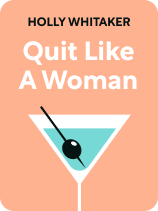

This article is an excerpt from the Shortform book guide to "Quit Like a Woman" by Holly Whitaker. Shortform has the world's best summaries and analyses of books you should be reading.
Like this article? Sign up for a free trial here.
Are you looking for Quit Like a Woman quotes? What do these quotes say about recovering from alcohol addiction?
In Quit Like a Woman, writer and long-term recovering alcoholic Holly Whitaker takes on society’s relationship with drinking and recovery. She argues that alcohol is always bad for our bodies but that alcohol companies have persuaded us that drinking is a normal part of adult life.
Continue reading for quotes from Quit Like a Woman.
Quit Like a Woman Quotes by Holly Whitaker
If the only alcohol addiction recovery program you’ve ever heard of is Alcoholics Anonymous, if you think drinking is normal and even healthy, and if you think alcoholism is a disease suffered by an unfortunate few, long-term recovering alcoholic Holly Whitaker is here to set the record straight. In Quit Like a Woman, Whitaker contends that we as a society see alcohol, addiction, and recovery all wrong—that is, exclusively through a masculine, patriarchal lens. This means we misunderstand what addiction is, what causes it, and how to treat it, especially for women.
Whitaker offers an alternative take on alcohol addiction. She explains how alcohol is always bad for you and how alcohol companies perpetuate the belief that you should be able to enjoy alcohol in moderation. She also offers a glimpse into her own journey to sobriety and presents a feminine, holistic approach to recovery.
Here are the best Quit Like a Woman quotes with explanations for context.
“Spending a night out drinking is akin to dismantling every piece of protection we have—our cognition, our decision making, our reaction time, our memory, our standards, our voice. If we thought about alcohol in this way—as something that undermines our collective momentum and personal agency and vitality and self-worth—what would that mean for us? What if we all rejected the poison—then what? I’ll tell you what: world domination, bitches.”
Whitaker asserts that cravings will arise but that you can cope with a craving by 1) accepting it, 2) ignoring the negative narratives you’ve woven around the craving (such as the belief that you can never resist cravings, that cravings mean you’re weak, and so on), 3) exploring the physical sensations of the craving—for instance a tightness in your chest, clenched fists, or other physical changes, and 4) waiting the craving out by not acting on it.
“Sobriety, if it is anything, is paying attention, seeing the wonder and the beauty around us that we so easily sprint by on our way to the next thing. And this is more than fun; this is actually living.”
Find forms of fun to replace the old, self-destructive ways you had fun, recommends Whitaker. These can be “normal” activities, just without the addictive substance (eating out, going to museums, picnics), childish activities (visiting a theme park, bouncing on a trampoline, goofing around with friends), or spending quality time alone (with a good book, show, or craft).
“Alcohol is the only drug in the world where, when you stop taking it, you are seen as having a disease.”
According to Whitaker, alcohol companies invest heavily in marketing that encourages people to continue drinking. This marketing portrays drinking as a normal part of adult life. Particularly for women, alcohol companies stress the normalcy of drinking at every stage in life: motherhood (de-stressing with a post-bedtime drink), career years (happy hours with friends), and retirement (pampering yourself with wine and liquor).
To justify continuing to sell a life-threatening product, alcohol companies promote the concept of “responsible drinking”: the idea that it’s the individual’s responsibility to drink moderately. They claim that if you can’t drink in moderation, it’s your fault because you have an intrinsic weakness.
Companies were able to come to this conclusion because an alcohol industry-funded study in the mid-20th century looked into the disease of alcoholism, rather than the toxicity of alcohol. Thus, ever since, we’ve concluded that alcoholism is a disease that affects certain people—not that alcohol itself is harmful.
“Finally, my hope, because here is the part of your dating life where you no longer date to find someone to fill the emptiness. You look for someone to share the fullness that you both already are.”
View everyone you encounter along your sobriety journey as a teacher helping you grow, recommends Whitaker. In this way, you can frame difficult people and situations not as obstacles to your happiness, but rather as enablers of your future happiness because they alert you to what you will and won’t tolerate.
When you become sober, you’re allowed to change in other, broader ways, assures Whitaker. You don’t owe it to anyone to remain the same person or to continue participating in activities you no longer enjoy. This might mean you lose some of the friends with whom drinking was your main shared activity and other friends who simply can’t be part of your journey—that’s okay.
“We are supposed to be able to tolerate it, and when we can’t, when it doesn’t feel good or things start going to hell for us, it’s not the substance that’s the problem—it’s us. We are damaged, weak-willed, defective, and totally fucked.”
Beyond the inescapable marketing efforts of alcohol companies, Whitaker also believes that we’re societally conditioned to view alcoholism as a terrible problem to avoid at all cost. As examples of this perspective, most people believe alcoholics shouldn’t be employed, and many consider the word synonymous with more pejorative terms, like “drunk,” “lush,” or “addict.”
Whitaker claims that we also view alcoholism as a binary state: You’re either a full-blown alcoholic, or you don’t have a problem at all.
Our collective view of alcoholism leads to bad consequences: Whitaker believes that because the label “alcoholic” carries so many negative connotations, people go to great lengths to persuade themselves they don’t have a drinking problem when in reality, they do. For instance, someone might convince themselves that because they only drink on weekends, they can’t be alcoholics, even though their weekend drinking always involves binging.
What’s more, people feel that as long as they don’t have symptoms of “true” alcohol addiction they can proceed to drink as they have been—even though their drinking may well be seriously harming them. And they can only determine what “true” alcohol addiction is by measuring themselves against other drinkers because there’s no standard diagnosis of alcoholism.

———End of Preview———
Like what you just read? Read the rest of the world's best book summary and analysis of Holly Whitaker's "Quit Like a Woman" at Shortform.
Here's what you'll find in our full Quit Like a Woman summary:
- Why society misunderstands what alcohol addiction is, what causes it, and how to treat it
- Why alcohol is always bad for you, even in moderation
- A feminine, holistic approach to recovery and sobriety






